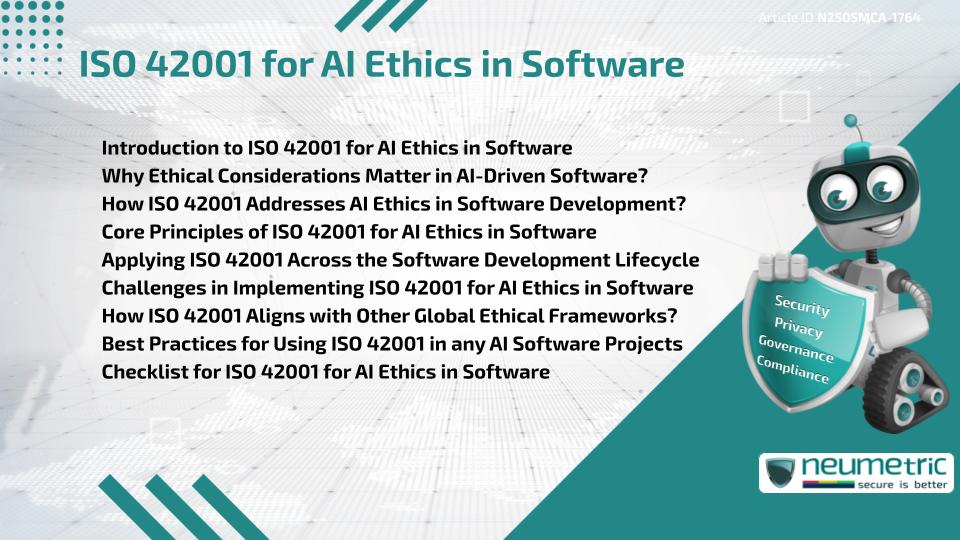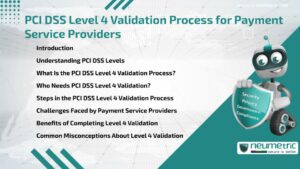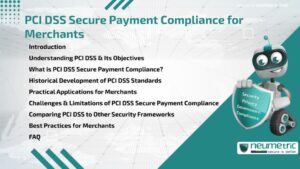Table of Contents
ToggleIntroduction to ISO 42001 for AI Ethics in Software
As Artificial Intelligence [AI] becomes more integrated into modern software, concerns around fairness, transparency & accountability have grown. ISO 42001 introduces a structured Framework for managing these AI Systems responsibly. It offers guidance for Organisations seeking to align their AI-enabled software with Ethical Standards.
ISO 42001 for AI ethics in software helps teams embed ethical practices into design, development & deployment. This article explores how the Standard works, its practical applications & how Organisations can benefit from it.
Why Ethical Considerations Matter in AI-Driven Software?
AI in software affects decisions related to Finance, Healthcare, security & more. When ethics are not considered, outcomes may be biased, misleading or harmful. For example, a hiring algorithm might sometimes favour certain groups if it is not properly trained on balanced data.
ISO 42001 for AI ethics in software helps ensure that such Risks are identified & addressed early. It requires teams to think beyond technical performance & consider social & human impacts. This leads to software that are not only functional but also fair & responsible.
How ISO 42001 Addresses AI Ethics in Software Development?
ISO 42001 defines requirements for an AI Management System [AIMS], which includes Governance, Risk Management & ongoing monitoring. The Standard emphasises:
- Transparent decision-making
- Responsible data handling
- Risk identification & mitigation
- Human involvement in AI Operations
- Continuous review of ethical impacts
Using ISO 42001 for AI ethics in software, developers & leaders can create AI Systems that meet both regulatory & societal expectations.
Core Principles of ISO 42001 for AI Ethics in Software
The foundation of the Standard is built on several Core Principles that reflect ethical priorities:
- Transparency: Clear documentation of how AI works
- Fairness: Avoiding discrimination or bias in outputs
- Accountability: Defining roles & ownership for outcomes
- Privacy & Security: It keeps the User data safe throughout the system
- Human Oversight: Keeping humans in control where needed
These principles ensure ISO 42001 for AI ethics in software remains aligned with global values on responsible innovation.
Applying ISO 42001 Across the Software Development Lifecycle
Ethical AI designing is not a single day task it is a continuous process. ISO 42001 can be applied across all phases:
- Planning: Set clear ethical goals for the AI function
- Development: Implement safeguards & document key decisions
- Testing: Evaluate system behaviour for unintended consequences
- Deployment: Ensure users understand the AI’s purpose & limitations
- Monitoring: Track performance & collect feedback for improvements
This lifecycle approach reinforces ethical thinking from start to finish.
Challenges in Implementing ISO 42001 for AI Ethics in Software
Despite its benefits, applying the Standard has its challenges:
- Smaller teams may lack resources or expertise
- Not all ethical Risks are easily measurable
- Balancing business goals with ethics can be difficult
- Requires buy-in from leadership & collaboration across departments
Still, ISO 42001 for AI ethics in software provides a clear roadmap that can be scaled according to an Organisation’s size & needs.
How ISO 42001 Aligns with Other Global Ethical Frameworks?
ISO 42001 doesn’t exist in isolation. It complements widely accepted standards like:
- OECD AI Principles
- UNESCO Recommendation on the Ethics of AI
- NIST AI Risk Management Framework
- ISO 31000 Risk Management
- ISO/IEC 27001 for Information Security
This compatibility makes ISO 42001 for AI ethics in software easier to adopt alongside existing Policies & frameworks.
Best Practices for using ISO 42001 in any AI Software Projects
To get the most out of ISO 42001, consider the following:
- Start Early: Incorporate ethical thinking during the planning stage
- Create Clear Roles: Define responsibilities for AI ethics administration
- Document Everything: Maintain traceable records of AI decisions
- Train Teams: Educate developers on the principles of ethical AI
- Engage Stakeholders: Involve users & affected parties in discussions
These Best Practices improve trust, reduce Risks & make implementation smoother.
Checklist for ISO 42001 for AI Ethics in Software
This checklist helps in the evaluation of the alignment with ISO 42001:
- Have ethical Risks been identified & documented?
- Are fairness & transparency integrated into system design?
- Is User data handled securely & ethically?
- Are AI decisions explainable & auditable?
- Is there a process for Stakeholder feedback?
- Are roles & responsibilities clearly assigned?
- Are systems regularly reviewed for ethical performance?
This tool supports consistent & successful deployment of ISO 42001 for AI ethics present inside the software.
Takeaways
- AI in software carries ethical Risks that require careful management.
- ISO 42001 offers a structured approach to embed ethical practices.
- This Standard promotes fairness, accountability & transparency in these AI Systems.
- Challenges exist but can be overcome with planning & training.
- Adoption of ISO 42001 improves both trust & long-term system value.
FAQ
What is ISO 42001 for AI ethics in software?
It is an international Standard that guides Organisations in managing AI responsibly by embedding ethical principles throughout software development.
How does ISO 42001 help in managing AI ethics?
It provides a Framework for Risk Assessment, transparency, Governance & ongoing monitoring of ethical impacts in AI-enabled software.
Is ISO 42001 only for large companies?
No, it is scalable & can be adapted by small, medium & large Organisations developing AI software.
What are the Core Principles of ISO 42001 for AI ethics in software?
These standards help to include transparency, fairness, accountability, Privacy & human oversight.
Is ISO 42001 applicable around the entire software lifecycle?
Yes, it is prepared to be implemented from planning to deployment through the after launch monitoring.
Can ISO 42001 be used with other standards?
Yes, it aligns closely well with the other ethical frameworks & Risk Management standards like the ISO 31000 & the NIST AI RMF.
What are the main challenges in using ISO 42001?
Common challenges include resource constraints, lack of expertise & balancing ethical goals with business needs.
Why is documentation important in ISO 42001 for AI ethics in software?
Documentation ensures transparency, traceability & accountability across all AI-related decisions & actions.
Need help?
Neumetric provides organisations the necessary help to achieve their Cybersecurity, Compliance, Governance, Privacy, Certifications & Pentesting goals.
Organisations & Businesses, specifically those which provide SaaS &AI Solutions, usually need a Cybersecurity Partner for meeting & maintaining the ongoing Security & Privacy needs & requirements of their Clients & Customers.
SOC 2, ISO 27001, ISO 42001, NIST, HIPAA, HECVAT, EU GDPR are some of the Frameworks that are served by Fusion – a centralised, automated, AI-enabled SaaS Solution created & managed by Neumetric.
Reach out to us!





